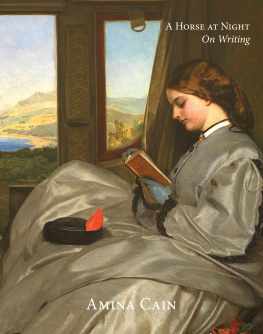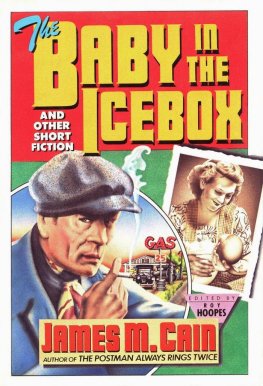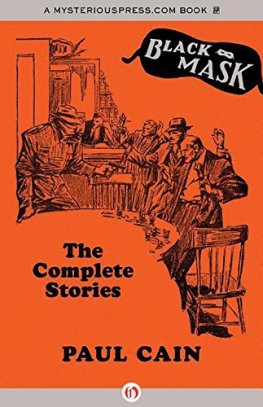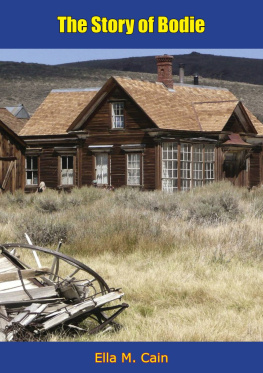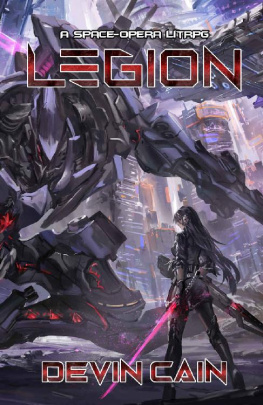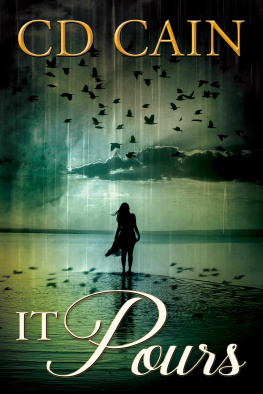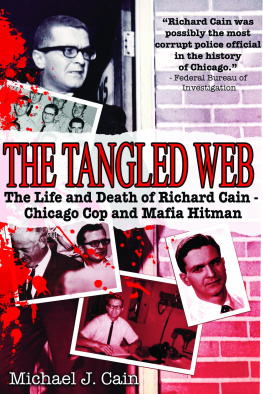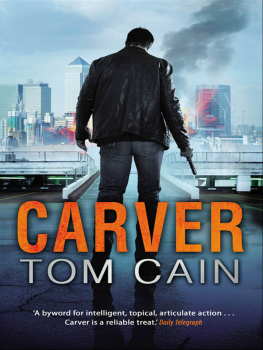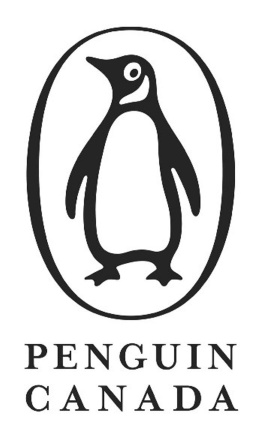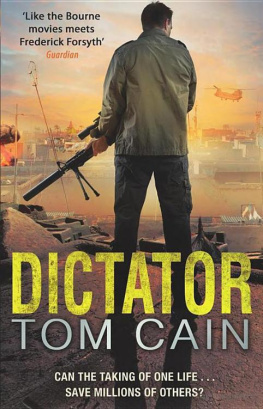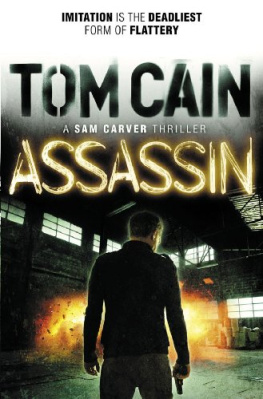All rights reserved, including the right of reproduction in whole or in part in any form.
The publisher wishes to thank Edil Hassan and Sebastian Mazza.
Names: Cain, Amina, author.
Title: A horse at night: on writing / Amina Cain.
Description: St. Louis, MO: Dorothy, a publishing project, [2022] |
Identifiers: LCCN 2022013859 (print) | LCCN 2022013860 (ebook) | ISBN 9781948980135 (paperback) | ISBN 9781948980142 (ebook)
Subjects: LCSH: Cain, Amina. | Novelists, American21st centuryBiography. | Cain, AminaBooks and reading. | FictionAuthorshipPsychological aspects. | Art appreciation. | LCGFT: Autobiographies. | Essays.
Classification: LCC PS3603.A3788 Z46 2022 (print) | LCC PS3603.A3788 (ebook) | DDC 818/603 [B]dc23/eng/20220427
Printed on permanent, durable, acid-free recycled paper in the United States of America
Dorothy, a publishing project books are distributed to the trade by New York Review Books
Dorothy, a publishing project | St. Louis, MO
A H ORSE AT N IGHT
On Writing
A MINA C AIN
D OROTHY , A PUBLISHING PROJECT
To my mother, Deborah Lou Miner, artist and adventurer
W ITHOUT PLANNING IT , I WROTE a diary of sorts. Lightly. A diary of fiction. Or is that not what this is? I wrote about reading fiction, and about writing it. Sometimes I read and thought about the books my friends had written (they were my friends partly because I felt great kinship with what they wrote), sometimes about books by writers I will never know. They are dead, or they are alive, but still I wont meet them. It is enough to read their work.
Yet, I have never kept a diary. Or I have tried, but it never stuck. Again and again I would begin: with a very short entry, or else with a long one that would come to stand on its own, there in the beginning of a notebook, followed by all of those blank pages. I dont know if, when I wrote essays, I was actually returning to the same space, if somehow I had managed to get back to those empty pages, managed to get back to a pasture of thought. And now that it is done, I am keeping a real diary for the first time in my life, or is it a pasture, mostly because when I cant, or dont have time, to work on my novel, I can still write there. Sometimes I trick myself when writing in my notebook; sometimes I end up working on the novel after all, in those pages. And that is the best reason to return to it, that it brings me closer to something I havent otherwise been able to get to, or that cant get to me. I want to go further into my writing, into my thinking. And do I?
*
I DROVE TO THE LITTLE SHOP when it was getting dark. I bought pears, persimmons, chard, butter, and ice cream. At home, I had already made potato leek soup. We know what Marguerite Duras said about leek soup.
Imagine surrounding your own soup. Imagine surrounding it with anguish.
At night I am surrounded by my books, not the one I am writing.
I wanted to write fiction because I saw something in Durass Lol Stein. I didnt know how to stop thinking about that character. Lol doesnt know how to stop thinking about her rejection by Michael Richardson, and I had a lot of ideas about rejection, as Id been rejected by a few people myself. I had rejected others, but I didnt think about that as much. It didnt hold the same fascination. I wanted to read about long walks in the summer when no one else is out on the street, the ocean not in view, necessarily, but near. I read The Ravishing of Lol Stein for the first time when I was in my late twenties. Then again in my late forties. I read The Lost Daughter by Elena Ferrante the second time in my late forties too; the first time had been a few years before that. In the same summer, I re-read them both. They made me long for summer right as I was experiencing it, a double immersionfiction and lifethat I enjoyed. In The Lost Daughter , it is Leda who does the rejecting so she can spend her summer alone, working and swimming.
I had taken my own long walks on hot emptied streets. I had walked near a lake that wasnt quite in view, like Lols wide river in South Tahla, and the memory of Town Beach. Now when I walk, it is the ocean that is somewhere in the distance. I have to drive thirty minutes to see it. Now I am walking with the mountains near me. The desert is in the opposite direction from the ocean.
Mountains or water or desert, the heat burns things away. A special kind of cleanse.
One reads or writes a novel like one goes out to walk in the heat, or into the rain, to buy the persimmon and the butter.
The little shop, I have gone to it a couple of times a week every week for many years. Can you picture me driving there, all that I was thinking, all that I was feeling? Picture it one hundred times. On this day this person was important to me, on this day another. Often it was the same person, the same people. There was something I needed from the shop, or I wanted to leave my desk. I dont think its bad to leave your desk, especially when you are going to a place that reminds you of the shop Laura discovers in Sylvia Townsend Warners Lolly Willowes , the one that is half florist, half green grocer. And so I have also always been thinking of Lolly.
The flowers that look like bright yellow balls, with soft little pinetree-like leaves, are standing in their bucket of water, not far from a large bowl of tangerines. Fresh flowers, and surrounded by darkness in that corner. How could I not think of Lolly, especially in the blustery seasons? I was glad I left my commonplace desk. I went back to it with those images in my mind.
For me, fiction is a space of plainness and of excess.
Lol stirred, she turned over in her sleep. Lol went out for walks through the streets, she learned to walk without having any special goal in mind. Reading it, I am happy. You might think that is simple. Now I know that I have always been here to see Lol, and that I always will be. One day my portrait will be painted, seeing her. That is what my gaze will symbolize. The gaze does symbolize. And not just seeing Lol, but Leda, in the water, walking through that beach town or at a fish market, and Lolly, finding her pleasure and her freedom in the Chilterns. Pleasure, freedom, torment, emptiness: it is what I want my writing to express. I dont know if I have ever actually expressed it.
You were in a rage, and then you were calm. You hid things, but you were real.
These characters whose names begin with L.
*
F OR YEARS NOW , WHENEVER I READ a short story or a novel, narrative has been impressing itself more and more visually in my mind. Or maybe its that my mind has gone more and more toward these fictional visions. Even though Im a writer, its not always language Im drawn to first. When I start writing a new story, I often begin with setting. Before plot, before dialogue, before anything else, I begin to see where a story will take place, and then I hear the narrative voice, which means that character is not far behind. Lately Ive been thinking a lot about landscape painting and literature, and perhaps as an extension of this I have started to think through the idea of character and landscape as similar things, or at least as intimates, co-dependent.

